Many industries use pins and fasteners in their daily operations, and these pins are very important in these activities. Pins come in different shapes and forms and can be used for various purposes. If people are not familiar with the nature, manufacturing, and use of pins, they may use them incorrectly.
Pins are ubiquitous in various crafts, fashion, electronics, and industrial applications. This guide delves into the different types of pins, their uses, and how to choose the right pin for your specific needs.
Different Types Of Pins
Cotter Pins
Description: These are simple wire pins with two prongs. They are used to hold parts together in a machine part, ensuring they don’t come loose in the long run.
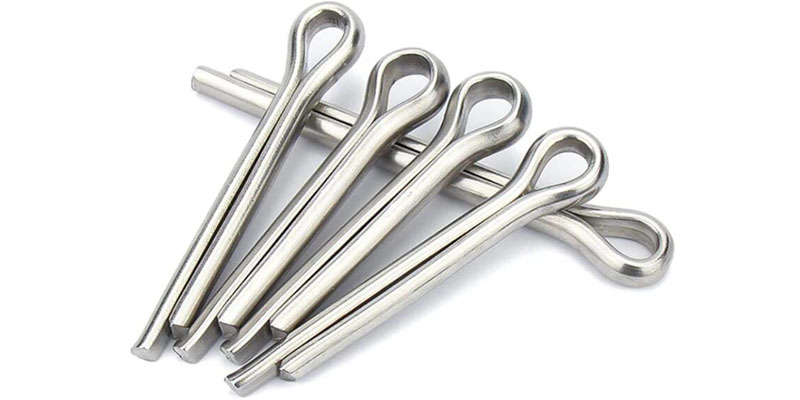
Types:
Hairpin Cotter Pins: Shaped like a hairpin, used for securing clevis pins.
R-Clip Cotter Pins: Resemble the letter ‘R’, used for securing axles and shafts.
Dowel Pins
Description: Dowel pins are cylindrical rods made from various materials like steel, stainless steel, and plastic. They are precisely manufactured to ensure tight tolerances.
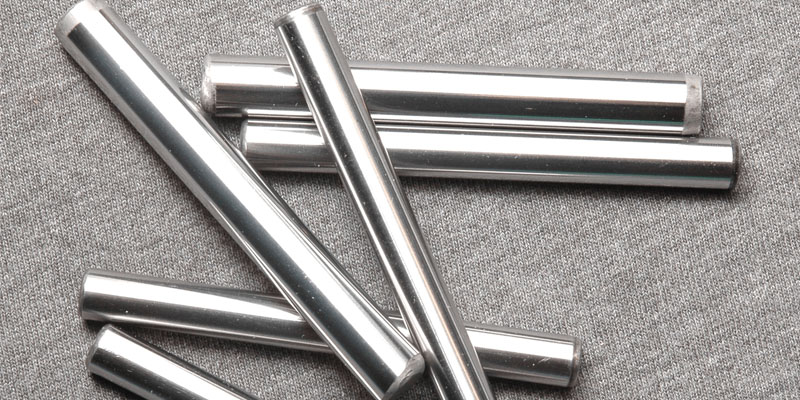
Types:
Standard Dowel Pins: Commonly used for aligning and joining components.
Tapered Dowel Pins: Feature a slight taper to ensure a tight fit.
Grooved Dowel Pins: Have longitudinal grooves to accommodate press-fit applications.
Clevis Pins
Description: Clevis pins are cylindrical fasteners with a hole through the head to accommodate a cotter pin for secure fastening.
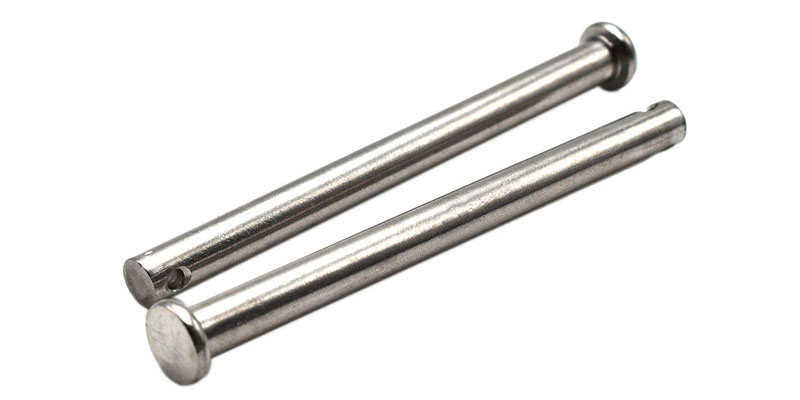
Types:
Standard Clevis Pins: Basic design with a through-hole for a cotter pin.
Shoulder Clevis Pins: Feature a shoulder for precise positioning.
Grooved Clevis Pins: Have grooves to enhance grip and prevent slippage.
Spring Pins
Description: Spring pins, also known as roll pins or tension pins, are hollow, cylindrical pins that compress and expand to fit into holes.
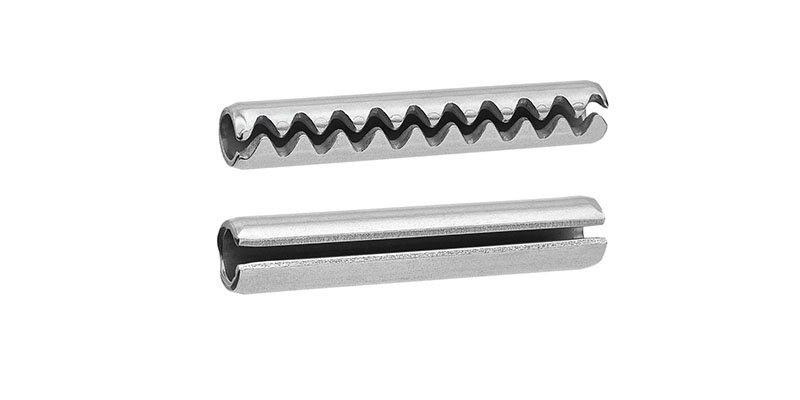
Types:
Slotted Spring Pins: Feature a longitudinal slot that allows compression.
Coiled Spring Pins: Made from coiled steel for greater flexibility and strength.
Taper Pins
Description: Taper pins have a uniform taper from one end to the other, ensuring a tight fit when driven into a hole.
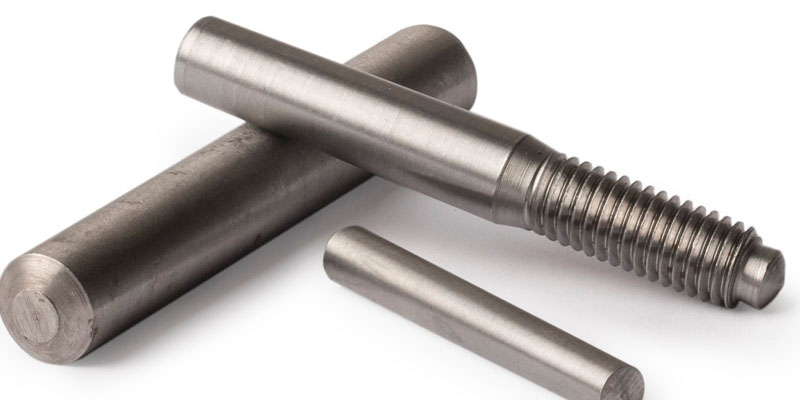
Types:
Standard Taper Pins: Basic tapered design for general use.
Threaded Taper Pins: Feature threads on the larger end for easy removal.
Knurled Pins
Description: Knurled pins have a ridged or textured surface to enhance grip and prevent rotation within the assembly.
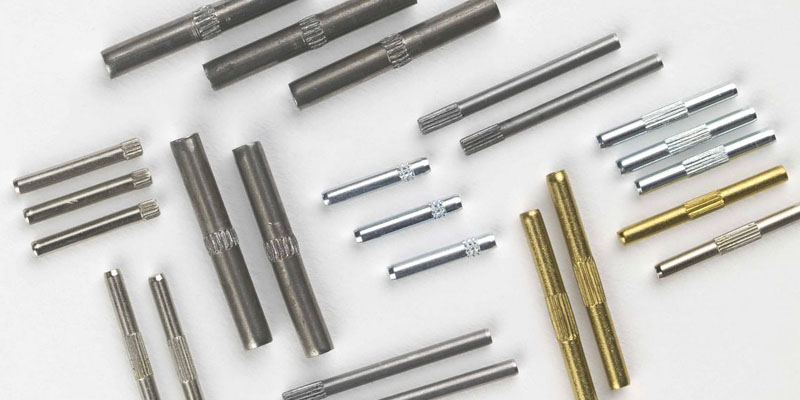
Types:
Straight Knurled Pins: Have a straight knurl pattern for a secure fit.
Helical Knurled Pins: Feature a helical knurl for increased grip strength.
Grooved Pins
Description: Grooved pins have longitudinal grooves to improve retention and grip in assemblies.
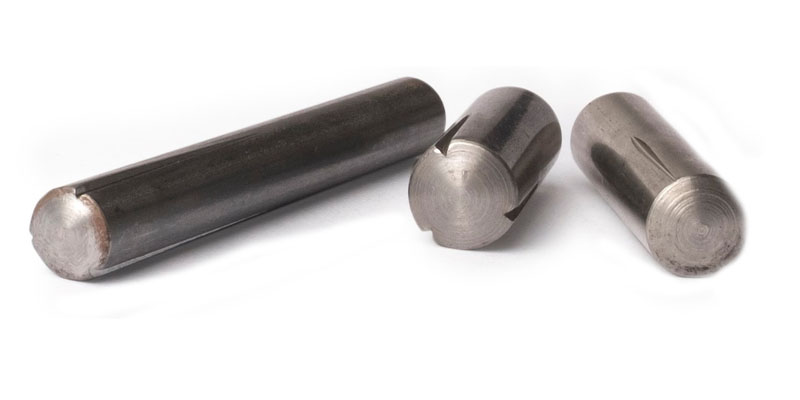
Types:
Full-Grooved Pins: Grooves run the entire length of the pin.
Half-Grooved Pins: Grooves run only partway along the pin.
Quick-Release Pins
Description: Quick-release pins are designed for rapid installation and removal without the need for tools.
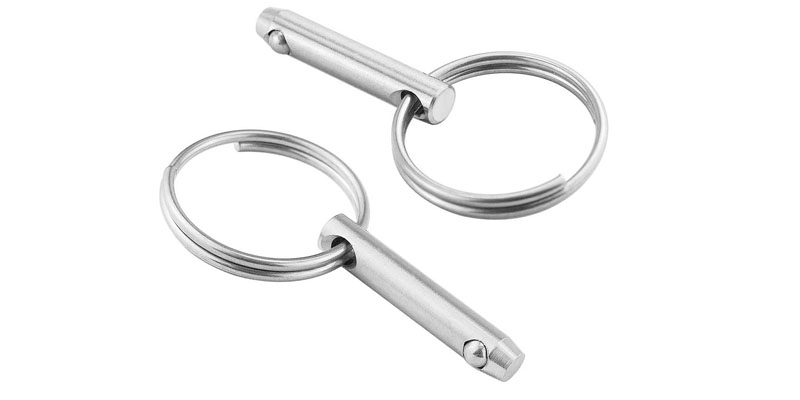
Types:
Button Handle Quick-Release Pins: Feature a button that releases the pin when pressed.
Ring Handle Quick-Release Pins: Have a ring that, when pulled, releases the pin.
Common Materials For Making Pins
Like rivets and other fasteners, pin fasteners come in various forms and materials. The materials used in manufacturing determine their purpose and specific purpose. The following are common pin materials.
Brass: This material helps pins resist corrosion while improving their aesthetics.
Aluminum: Aluminum is very suitable for lightweight nails because this material is not heavy. It also gives the pins corrosion resistance.
Steel: Steel material represents strength and durability; Therefore, the steel pin is sturdy and durable. They can be used in almost all industries.
Titanium: This material is very suitable for producing machine pins used in heavy-duty or mechanical industries that require high-performance pins. This is due to its durability, light weight, and high strength
Advantages Of Using Pin Fasteners
Pin fasteners are important in the daily operations of many industries. Here are some advantages of using pin fasteners.
Durability
Depending on the material, the pin can reliably secure the two components together. Most pins are made of steel, brass, or aluminum, thus possessing excellent strength, corrosion resistance, and reliability.
Universality
Pins can be used in various industries, and their application will change with the change of usage. They can be used in the construction, manufacturing, automotive, or aerospace industries. In addition, pins can be used in combination with other fasteners such as washers, bolts, and nuts to provide better stability and support.
Easy to install
As long as you understand the working mechanism of pin fasteners, you can easily install and remove them. They do not require any specific tools or unique mechanisms and can be manually disassembled. This feature makes the pin an ideal choice for various applications that do not require power.
Cost effectiveness
Pin fasteners are a cheaper way to secure device components together. Their manufacturing cost is not high and they can be easily produced in large quantities. Therefore, pins are the perfect fastener tool for the mass equipment industry.
Safe and adjustable
Pins can be used to secure equipment components that need to be adjusted from time to time. They can also be used for equipment and devices that are susceptible to vibration. In addition, the installation of the pins does not require heating or electricity, thereby reducing the risk of electric shock and injury.
Factors To Consider When Selecting Pin Types
Material: Ensure the pin material is suitable for your project (e.g., stainless steel for rust resistance).
Length and Thickness: Choose the appropriate size for the materials you are working with.
Head Type: Select a head that meets your needs, whether for decoration, functionality, or ease of use.
Application: Ensure the pin is designed for your specific application, whether it be sewing, fastening, or electronics.
The Application Of Pins In Various Industries
Due to the unique purpose and requirements of each pin fastener, different industries use different pins. For example, metal pins (steel, brass, titanium) are suitable for heavy-duty activities. Stainless steel is an ideal choice for marine operations because it has strong corrosion resistance.
The Automotive Industry
Split pins can fix the wheels and other parts to the axle or axle. To adapt to vibration, fix the wheels with split pins and slotted nuts. In addition, U-shaped pins can be used for shock absorbers and brakes in cars. It is also very suitable for traction equipment, as it can fix movable parts between two workpieces.
Medical Industry
In the medical industry, corrosion-resistant pins are the best choice as they may come into contact with healthcare. The positioning pin is very suitable for use as a surgical distractor bracket and tweezers. These scissor style tweezers have a hinge that connects two main components. Without a hinge, they cannot function properly. Open mouth sales are also very convenient in critical situations such as the respiratory system.
Machines And Equipment
In the machinery and equipment industry, locating pins are the easiest to use fastener pins because they can be connected before fixing machine parts with screws. For machines with gear shafts, such as grinding engines, you can use pins to lock the gear shaft in place during maintenance and adjustment.
In addition, U-pins are very convenient in textile machinery because they can avoid vibration. Other types of locking pins, spring plungers, welding brackets, and quick release pins that can be used in the machinery and equipment industry.
Conclusion
Pins play an integral role in manufacturing, offering solutions for alignment, fastening, and securing components. Understanding the various types of pins and their applications will help you select the right pin for your manufacturing needs, ensuring durability, precision, and efficiency in your projects. Whether you are working with heavy machinery, automotive parts, or intricate mechanical assemblies, there is a pin designed to meet your specific requirements.



